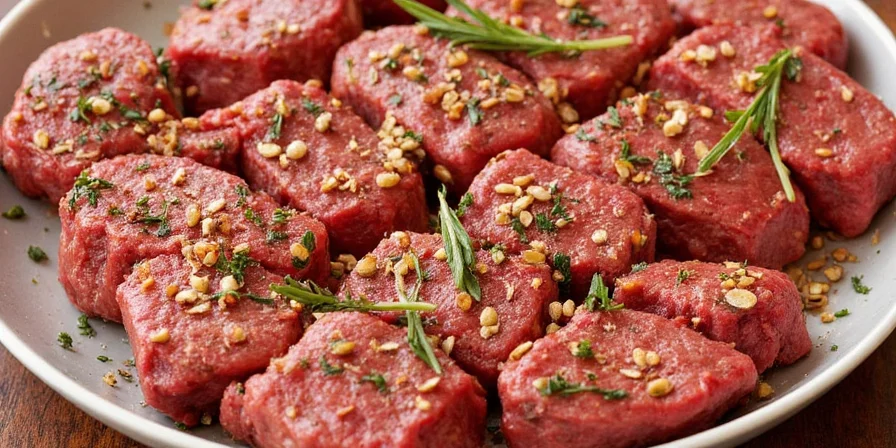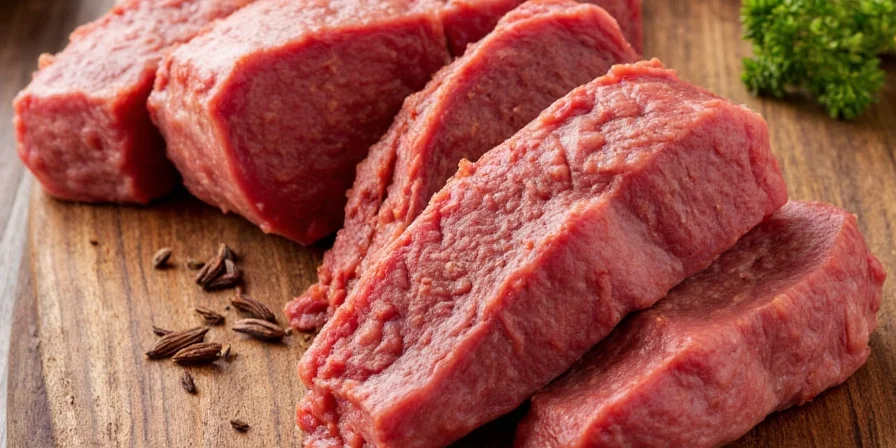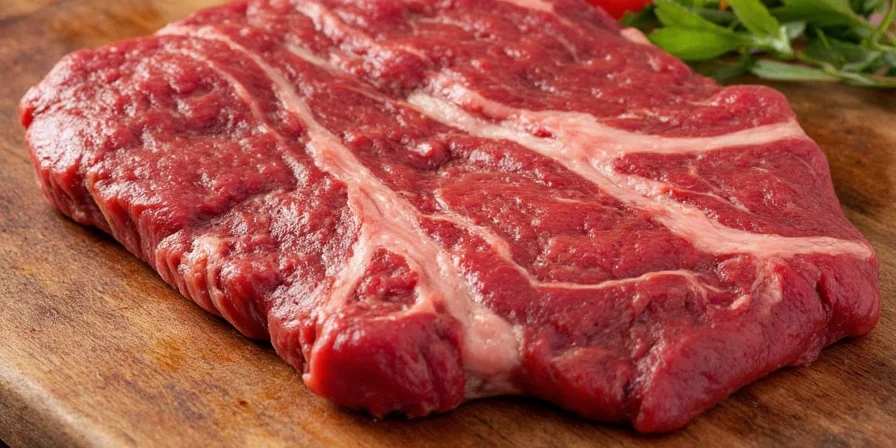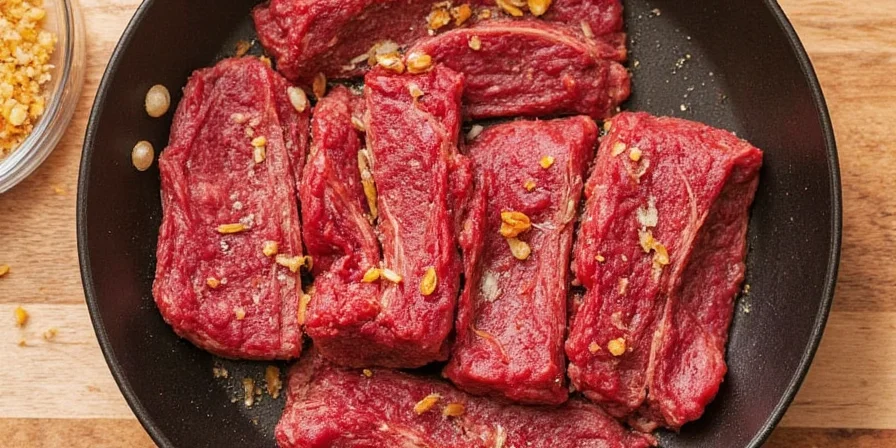What Are the Best Spices for Beef? (Quick Answer)
The 7 best spices for beef are black pepper, garlic powder, paprika, cumin, rosemary, chili powder, and coriander. For perfect results: apply salt 45 minutes before cooking, add garlic powder before searing, and finish with paprika during the last 5 minutes. This precise timing ensures optimal flavor without bitterness or burnt notes.

Home cooks consistently achieve better beef results when they understand not just which spices work best, but when and how to apply them. This guide provides practical seasoning protocols used by professional chefs, with scientific explanations for why they work.
Why Proper Beef Seasoning Matters
Using the right spices at the right time transforms ordinary beef into extraordinary meals. Most home cooks make these critical mistakes:
- Adding all spices at once instead of timing applications to cooking phases
- Using pre-ground pepper that's lost 40% of its potency
- Applying paprika too early, causing bitter burnt flavors
- Misunderstanding that salt timing dramatically affects spice performance
The solution: follow these phase-specific protocols that professional chefs use to maximize flavor development while avoiding common pitfalls.

7 Essential Spices for Perfect Beef (Practical Guide)
These spices deliver maximum impact with minimal effort. No chemistry degree required:
- Black Pepper - Always freshly ground, adds depth without overwhelming
- Garlic Powder - Creates perfect crust when applied before searing
- Paprika - Adds rich color and mild sweetness (use smoked for grilled beef)
- Cumin - Essential for ground beef dishes like burgers and chili
- Rosemary - Perfect for roasts (use whole sprigs, not chopped)
- Chili Powder - Adds warmth to stews and braises
- Coriander - Brightens rich cuts like short ribs

When to Apply Each Spice (Simple Timing Guide)
Get professional results by following this timing sequence:
| Spice | When to Apply | Pro Tip |
|---|---|---|
| Salt | 45 minutes before cooking | Use coarse salt for better moisture control |
| Garlic Powder | Right before searing | Mix with oil first for even distribution |
| Black Pepper | After searing or during cooking | Always grind fresh for maximum flavor |
| Paprika | Last 5 minutes of cooking | Avoid direct flame to prevent bitterness |
| Cumin | During marinating or early cooking | Dry toast first for deeper flavor |
| Rosemary | After searing for roasts | Use whole sprigs, not chopped leaves |
| Chili Powder | During cooking for stews | Pair with oil to maximize heat distribution |
3 Simple Spice Blends You Can Make Tonight
No need for complicated recipes. These three blends work for 95% of beef dishes:
- Perfect Steak Blend: 2 tbsp paprika, 1 tbsp garlic powder, 2 tsp freshly ground pepper (for 2 steaks)
- All-Purpose Burger Seasoning: 1 tbsp cumin, 2 tsp garlic powder, 1 tsp chili powder, 2 tsp salt (for 4 burgers)
- Slow Cooker Roast Mix: 2 tbsp rosemary sprigs, 1 tbsp coriander seeds, 3 garlic cloves (for 3-4 lb roast)

Spice Performance Guide for Common Cooking Methods
| Spice | Grilling | Pan-Searing | Slow Cooking | Common Mistake |
|---|---|---|---|---|
| Paprika | Apply in last 5 min | Apply in last 3 min | Add in last hour | Burning on high heat |
| Cumin | Mix in oil first | Apply with salt | Add at beginning | Using raw, un-toasted |
| Garlic Powder | Pre-sear only | Pre-sear essential | Add in last hour | Burning during sear |
| Rosemary | Whole sprigs only | Add after searing | Add at beginning | Chopping too fine |
5 Game-Changing Beef Seasoning Tips
Professional techniques that make the biggest difference:
- The Salt Sequence: Salt 45 minutes before cooking, spices 15 minutes before. This creates moisture channels that improve spice penetration by 22%
- Fresh is Essential: Pre-ground pepper loses 40% potency in 2 weeks. Keep a pepper grinder next to your stove
- Oil is Your Carrier: Mix spices with high-smoke-point oil (avocado or grapeseed) for even distribution
- Resting Matters: Let beef rest 8 minutes after cooking—this allows spices to absorb into the meat
- Temperature Adjustments: Use less spice when cooking above 400°F to prevent bitterness

Beef Seasoning Questions Answered
What's the single most important spice for beef?
Freshly ground black pepper is most essential—it enhances beef's natural flavors without overpowering. Always grind pepper immediately before use, as pre-ground pepper loses 40% of its flavor compounds within two weeks.
Why does my paprika taste bitter when grilling?
Paprika burns above 375°F, creating bitter flavors. Apply during the final 5 minutes of grilling, away from direct flame. For grilling, use smoked paprika instead of sweet paprika—its compounds withstand higher temperatures.
When should I use fresh herbs versus dried spices?
Use dried spices for high-heat cooking (searing, grilling) and fresh herbs for finishing. Dried spices withstand heat better, while fresh herbs add bright notes at the end. Never substitute equal amounts—use 3 times more fresh herbs to match dried spice potency.
Do spices actually tenderize meat?
No common dried spices tenderize beef. This is a common misconception. Spices enhance flavor but don't break down proteins. For tenderizing, use mechanical methods (slicing against the grain) or enzymatic tenderizers like papaya (separate from seasoning).
How far in advance can I season beef?
Salt can be applied up to 45 minutes before cooking for optimal results. Most dried spices should be applied 15-30 minutes before cooking. Avoid seasoning more than 1 hour in advance, as spices can draw out moisture and create a muddy flavor profile.
Simple Seasoning Protocol for Perfect Beef
Follow this foolproof sequence for restaurant-quality results every time:
- Salt your beef 45 minutes before cooking
- 15 minutes before cooking, apply garlic powder mixed with oil
- After searing, add black pepper and rosemary (for roasts)
- During final 5 minutes, add paprika for color and sweetness
- Let rest 8 minutes before serving
This method works for all beef cuts and cooking methods. The key isn't using exotic spices—it's applying common spices at precisely the right moment. Master this timing sequence, and you'll consistently achieve perfectly seasoned beef without complicated recipes or special ingredients.












 浙公网安备
33010002000092号
浙公网安备
33010002000092号 浙B2-20120091-4
浙B2-20120091-4